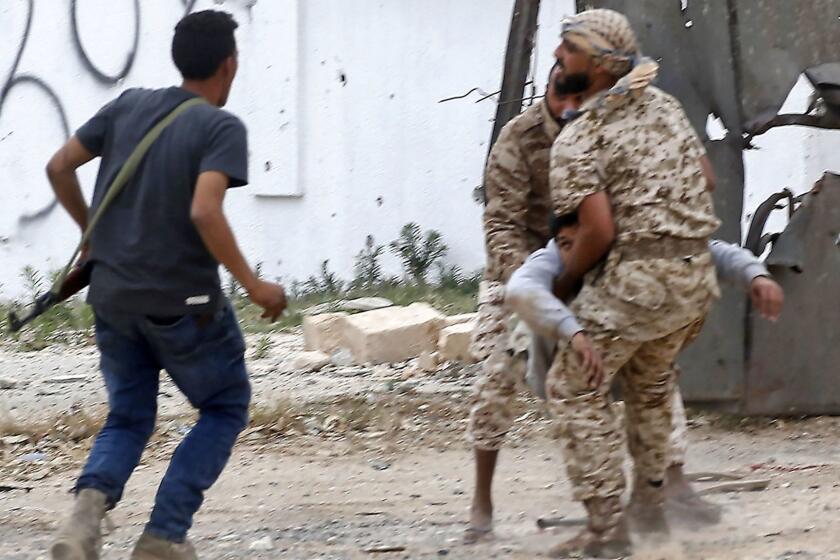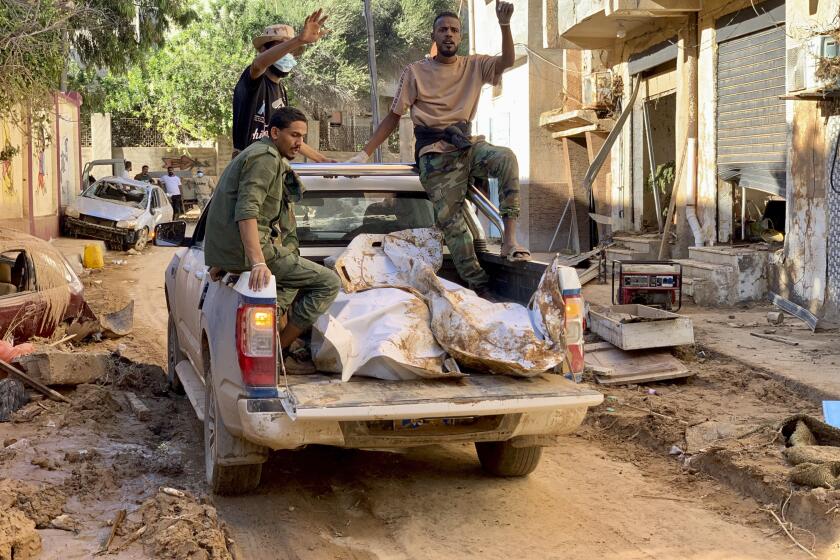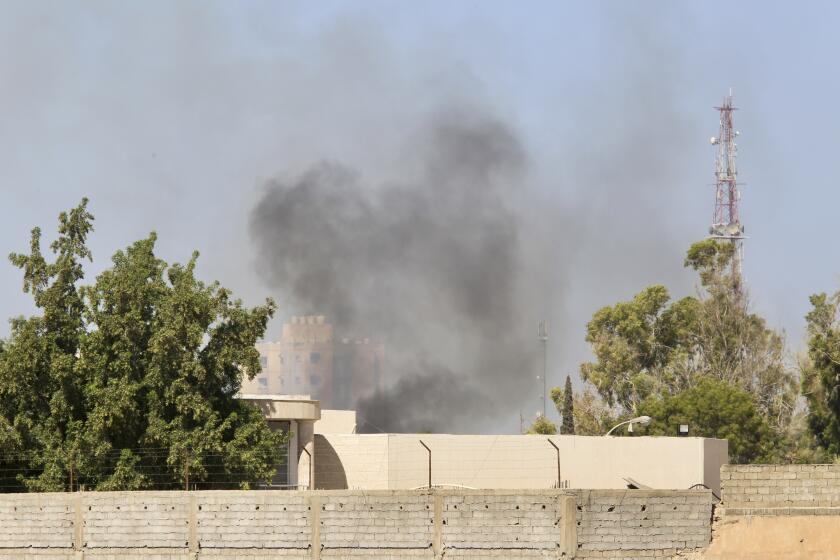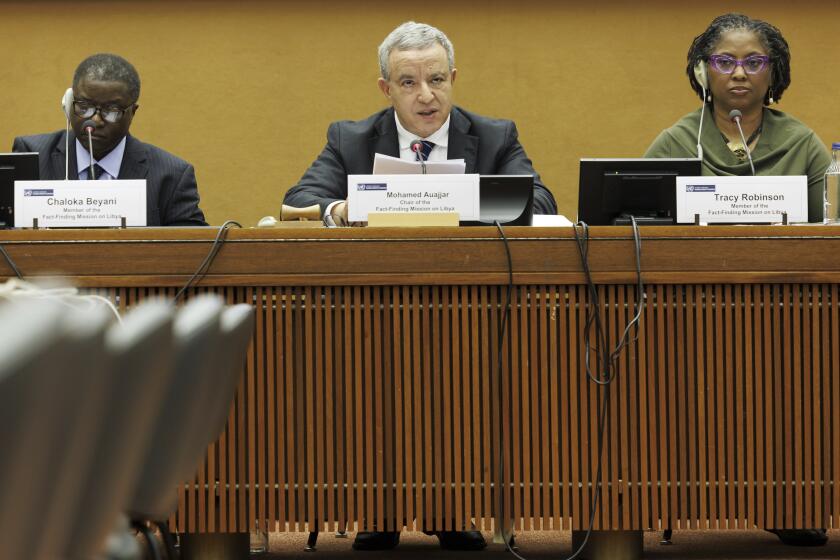Horrific dam collapses epitomize Libya’s failures. Why were so many warnings ignored?
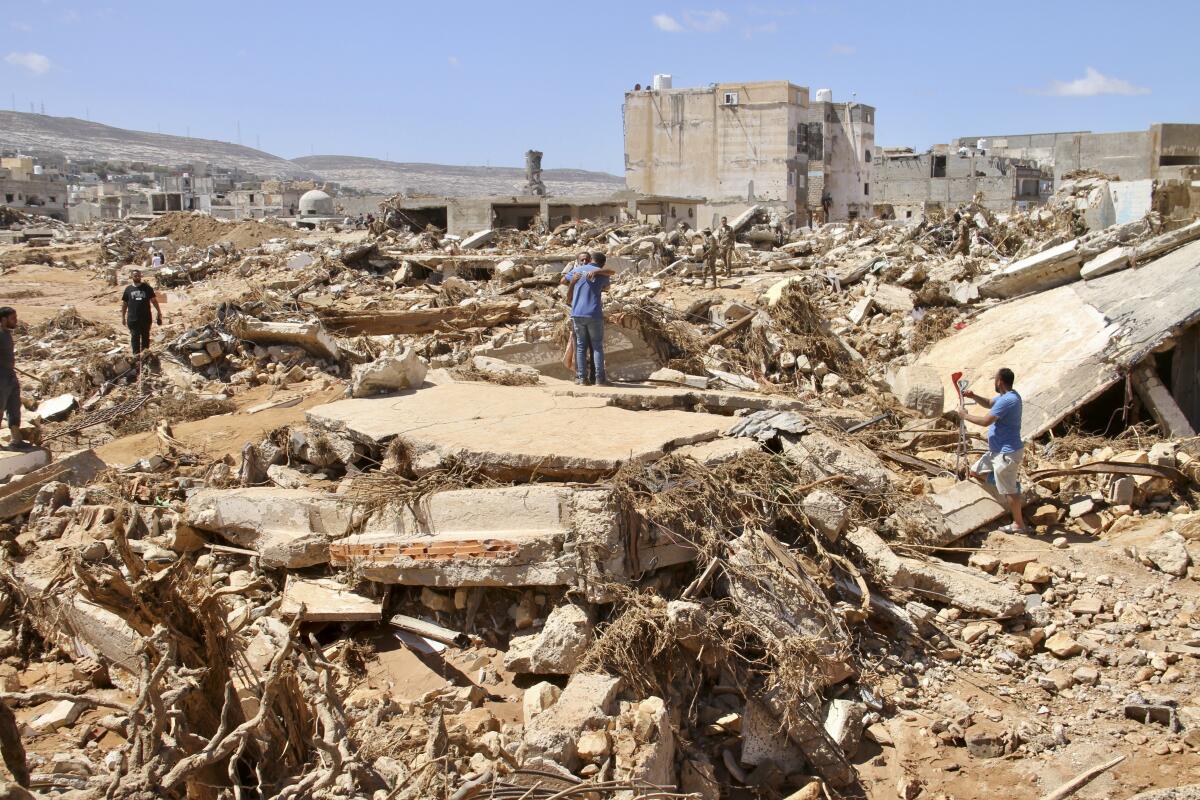
- Share via
BEIRUT — Amid the search for thousands of people washed away when two storm-swollen dams burst, amid the burials and bewilderment in the Libyan city of Derna, sorrow has given way to rage.
More than a week after Storm Daniel punched through the dams made of compacted clay, with the death toll at anywhere from 4,000 to over 11,000, recriminations — and demands for punishment — are mounting.
Libyans question why the dams failed — why they weren’t repaired or replaced despite stark predictions of disaster — and why residents got confusing and contradictory instructions before floodwaters washed away buildings, bridges, neighborhoods.
For many in the troubled North African nation of some 7 million, the dams’ disintegration has become a symbol of both the dysfunction and venality of Libya’s political class.
“People know this is a crime, not just a natural disaster. And they want someone to be held accountable,” said Awad Alshalwy, an English teacher in Derna working as a volunteer with rescue crews. Infrastructure in Derna had long been neglected, he said, with any money earmarked for upgrades stolen by politicians.
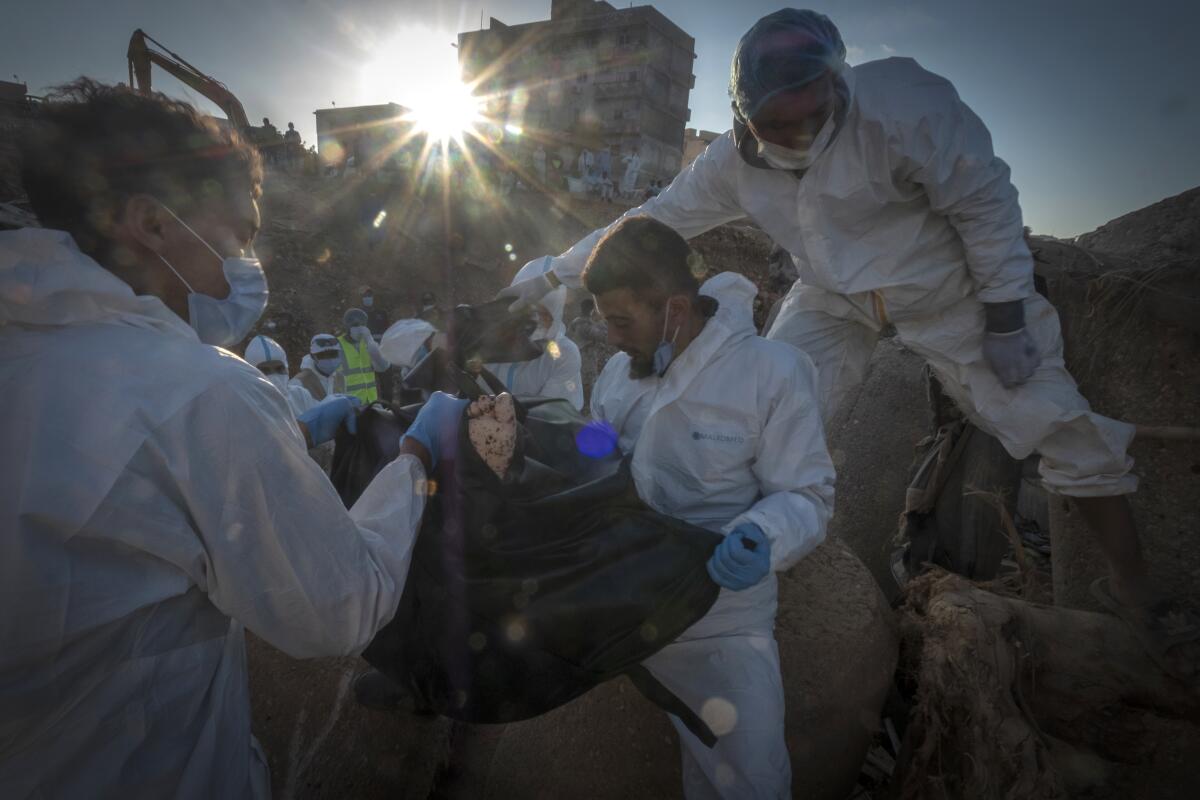
“There were problems with everything. Compared to Benghazi or Tripoli, it was as if Derna was in another country.”
On Monday, hundreds of protesters gathered outside the city’s Al Sahaba mosque for the first public demonstration since the devastating flood, shouting slogans excoriating top officials.
A group of Derna residents released a statement to Libyan and international authorities demanding investigations be sped up. And they want prosecutions of “everyone who had a hand in the negligence or thefts ... without covering up any criminal, whoever they may be, as there is no one more important than the people we lost.”
The dams underscored successive governments’ blasé attitude toward infrastructure.
In Morocco, an earthquake left thousands dead. In Libya, floods washed neighborhoods away. But lifesaving help is snarled in politics and rivalries.
The dams were constructed in the 1970s by a Yugoslav company in the Wadi Derna basin. The larger dam, Boumansour, which is nearly nine miles from the city of Derna, stood about 250 feet tall and could hold nearly 800 million cubic feet of water. The other, Bilad, had a capacity of about 53 million cubic feet; less than a mile from Derna, it was meant to protect the city from flooding.
There were concerns for years about the dams’ stability, with a sharp warning coming last year.
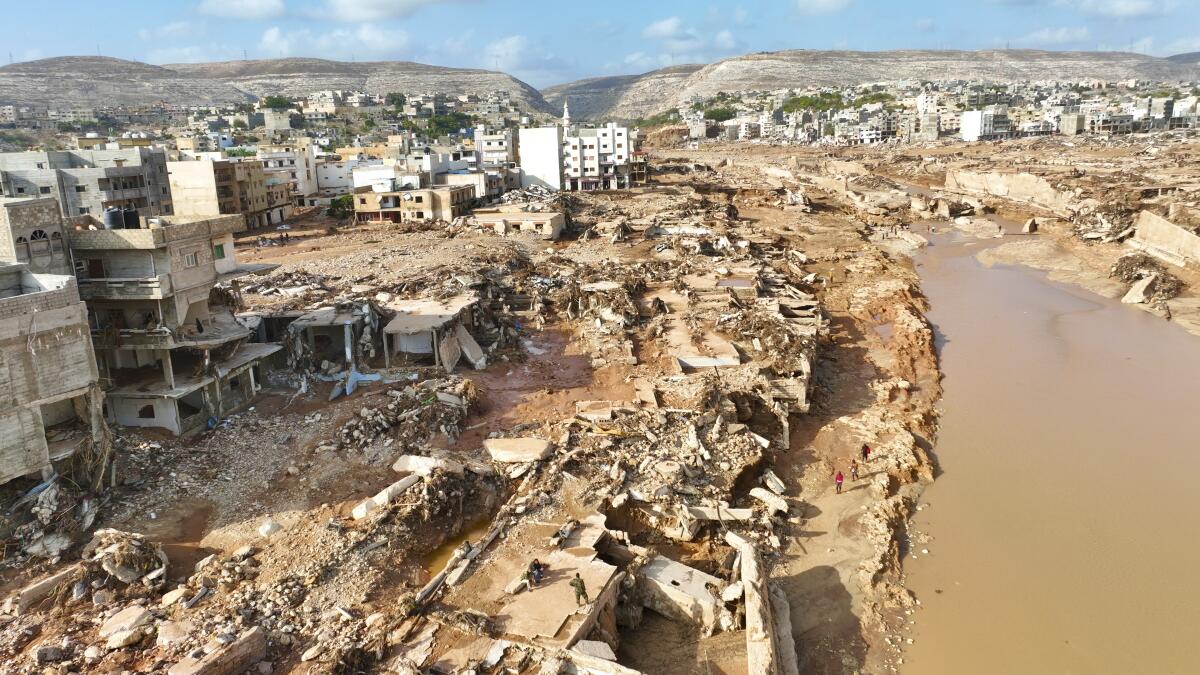
Previous storms, going back to 1986, had damaged the dams’ structure, a Libyan hydrologist said in an academic paper. A 2011 storm brought a wave of panic when water reached more than two-thirds of Boumansour’s height.
“The current situation requires officials to take immediate measures to carry out periodic maintenance of the dams,” Abdul Wanis Ashour wrote in the paper released in the Sebha University Journal of Pure & Applied Science.
He added that years of soil erosion in the valley and a subsequent lack of plant cover meant floodwater would encounter little to slow its path to the city.
“Recurring floods from time to time have become a constant threat for residents of the valley and the city of Derna,” he wrote. “In the event of a huge flood, the result will be catastrophic for the residents of the valley and the city.”
Chaos and neglect
In 2007, when Libya was still ruled by strongman Moammar Kadafi, a Turkish company, Arsel, was tasked with rehabilitating the dams and building a third dam in between.
But after Kadafi was toppled in 2011 in a North Atlantic Treaty Organization-backed uprising, and later killed, all such projects languished. Nevertheless, on its website, Arsel claimed it started work in 2007 and finished Nov. 28, 2012. The website has since been taken down. The company did not respond to an email sent to the contact listed on an archived page.
After Kadafi’s ouster, civil war broke out and the country was riven by two rival governments, one internationally recognized in the west, and the other a regional administration covering the east.
On paper, Libya should be booming. It’s one of the world’s top 10 countries in oil reserves.
In 2014, Derna was taken over by Islamic State militants who were ousted by other Islamist factions. Then Khalifa Haftar, the septuagenarian general and former CIA asset who controls Libya’s east, mounted a two-year siege followed by a devastating campaign to control the city, which he did in 2019.
And the dams remained a danger, thanks to corruption, a paranoid security apparatus viewing Derna as a threat rather than a city worth fixing, and the political chaos of competing governments. That chaos is one reason for the widely divergent death toll estimates.
Even though millions of dollars had been allocated for maintenance in 2012 and 2013, a 2021 report by Libya’s Audit Bureau found that no work had been done. Though some of the money had been deducted, there appeared to be no clarity as to where it had gone.
That’s a routine state of affairs for much of Libya’s investment budgets, said Wolfram Lacher, a senior associate at the German Institute for International and Security Affairs.
“Generally speaking, no one really knows where this money has gone,” he said. “There are widespread allegations of large tranches of it being embezzled.”
With a death toll that has surpassed 11,000, recovering the bodies of flood victims in Libya on both land and sea has become an urgent problem.
Now, Derna residents, in their demands to international and Libyan officials, want to ensure there’s no repeat. They’ve called for “assigning an international consulting office to prepare all engineering, surveying and financial studies related to the reconstruction process.”
Stephanie Williams, who worked as the United Nations secretary-general’s special advisor on Libya, said a joint Libyan and international expert committee should steer recovery funds.
“Time is of the essence,” she wrote on X, the social media platform formerly known as Twitter, “given the predilection of Libya’s predatory ruling class to use the pretext of ‘sovereignty’ and ‘national ownership’ to steer such a process on their own and in a self-interested manner.”
An avoidable tragedy
Fury has also been directed at officials for conflicting and confusing messages to residents as Storm Daniel bore down on Libya.
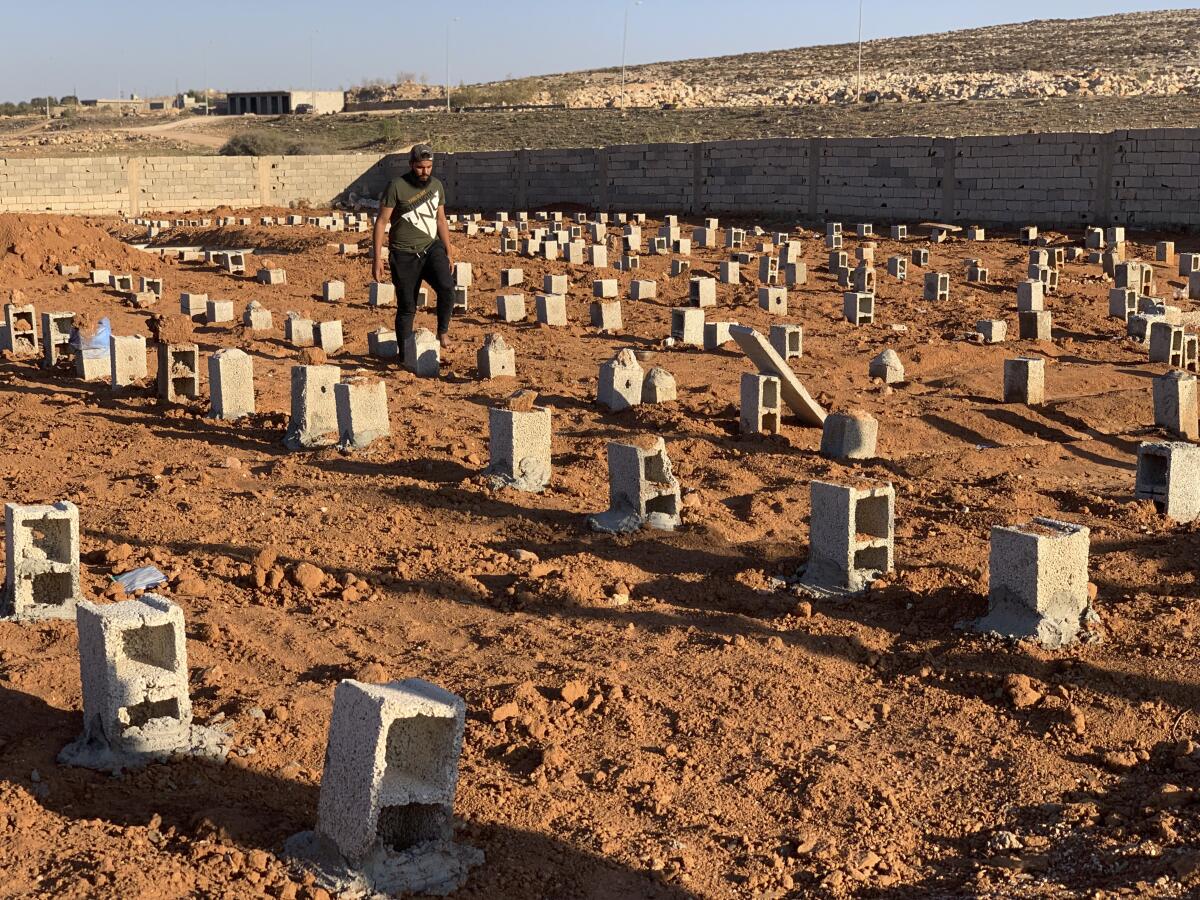
The night of the storm, the Derna Security Directorate released a video announcing a curfew. The Water Resources Ministry, meanwhile, told readers on its Facebook page that the dams were “in good condition” — even as they were filling up to dangerous levels and observers warned of imminent danger.
“I blame officials from here,” said one resident interviewed by the channel Libya Live who said he lost 25 members of his family. “Don’t tell me to stay home, that there’s a curfew. During war you forced me out with the power of arms. This is mass destruction, a time bomb right behind my yard. You should force me out.
“I stayed home and I lost everyone. Twenty-five souls. Who can help me now?”
Derna Mayor Abdulmenam Ghaithi, a relative of the eastern administration’s parliament speaker, said in an interview with the Hadath satellite channel last week that he had ordered an evacuation days before the dams burst. He said the city used loudspeakers to warn people of the danger and instruct them to leave.
Breaking News
Get breaking news, investigations, analysis and more signature journalism from the Los Angeles Times in your inbox.
You may occasionally receive promotional content from the Los Angeles Times.
There have been conflicting reports as to what residents were actually told. Some reported receiving text messages telling them to remain at home. Some officials said residents complained their warnings were overblown.
Ghaithi has since been suspended by the eastern administration and is under investigation.
Officials in the eastern government have insisted that what happened in Derna was a function of fate, nothing more.
“God wills and acts. Don’t say, ‘If only we’d done this or that,’” Aguila Saleh, the parliamentary speaker of the Benghazi-based eastern administration, said in an emergency session last week. “What happened in our country was a natural catastrophe.”
Authorities say clashes between rival militias in Tripoli, Libya’s capital, have killed at least 27 people and left residents trapped in their homes.
The same day, Prime Minister Abdul Hamid Dbeibah, who heads the government based in Tripoli, the capital, spoke of what he called “lost money,” and blamed war and negligence for the tragedy.
Libya’s general prosecutor, Sediq Sour, said allocations for the dams from previous governments will be scrutinized.
“I reassure citizens that whoever made mistakes or negligence, prosecutors will certainly take firm measures, file a criminal case against him and send him to trial,” Sour said at a Friday news conference.
But few believe that will happen, said Lacher, the Libya analyst.
The European Union defends its record of helping migrants in Libya after U.N.-backed investigators accused the bloc of enabling human rights abuses.
“The chance of an investigation succeeding is very, very slim. If it’s undertaken by any Libyan side, it risks being politically instrumentalized or extremely superficial,” he said.
Alshalwy, the teacher in Derna, agreed.
“The courts are bribed. No one in Libya with more than a million dollars was ever imprisoned,” he said.
“The international community needs to hold these people accountable. We can’t let them get away with it.”
More to Read
Sign up for Essential California
The most important California stories and recommendations in your inbox every morning.
You may occasionally receive promotional content from the Los Angeles Times.

